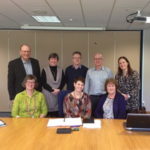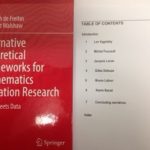Weaving our knowledge together: Uncovering Pasifika learners mathematical funds of knowledge
This project focused on recognising and recording the mathematical funds of knowledge of young Pacific students, sharing this with teachers, and then using the data to develop and enact culturally relevant, mathematically challenging, group-worthy tasks. Over a period of 3 years, the project involved 42 families and their children from two primary schools and 20 teachers. Drawing on a two-phase cyclical approach, the research team first worked with the young Pacific learners and their families to support them to document their mathematical funds of knowledge and share stories of their daily lives at home and in the community that involved mathematics. The second phase of each cycle involved collaborative work with the teams of teachers to share the data related to students’ mathematical funds of knowledge and draw on this in task design followed by trial task enactments. The project report is available at: https://tlri.org.nz/wp-content/uploads/2024/11/1293-Final-Report.pdf
Project Team: Jodie Hunter, Bobbie Hunter, Louise Fitzgerald, John Tupouniua
Funding: TLRI
Equity in Secondary Mathematics
Most New Zealand secondary mathematics classes are organised in ways that group students with relatively similar achievement. However, contrary to beliefs that these grouping practices improve achievement, ‘ability grouping’ exacerbates existing achievement differences. Māori, Pāsifika, and low-SES students are over-represented in ‘bottom’ classes which frequently experience a limited and limiting curriculum. Despite strong evidence for the benefits of mixed ability grouping, few secondary schools have shifted their achievement grouping practices. This qualitative study involves three mathematics departments which took the unusual step of independently self-initiating reduced use of ‘ability grouping’. Utilizing co-generative dialogues, the teachers share and critically reflect on the rationale, expectations, and ongoing adaptations of classroom routines, pedagogies, and student learning outcomes associated with the transition process.
Research Team: Professor Glenda Anthony and Dr David Pomeroy (University of Canterbury)
Funding: Woolf Fisher Trust and Massey University (CeRME) and University of Canterbury
- Learning the work of ambitious mathematics teaching
 This project explores how practice-based pedagogies within initial teacher education can support prospective teachers to learn the work of ambitious mathematics teaching. Underpinned by the belief that all students can develop positive mathematical identities and become powerful mathematical learners, ambitious mathematics teaching involves skilled ways of eliciting and responding to…
This project explores how practice-based pedagogies within initial teacher education can support prospective teachers to learn the work of ambitious mathematics teaching. Underpinned by the belief that all students can develop positive mathematical identities and become powerful mathematical learners, ambitious mathematics teaching involves skilled ways of eliciting and responding to… - The effects of structural changes on teacher educatorsOur project explores how structural and policy changes influence teacher education practices ‘on the ground’ at two distinct sites: Massey University and Manchester Metropolitan University, UK. The project investigates teachers’ differential responses to structural and policy change. It represents theoretical development, providing an explanation for the implementation of new policy.…
- Theory meets method in mathematics education research
 This project is about ideas and different ways of theorizing and analyzing mathematics education. It explores the fundamental philosophical tenets underpinning key theoretical frameworks and investigates how these tenets map onto particular kinds of research practice in mathematics education research. Our focus is on six key philosophical sources, namely Vygotsky,…
This project is about ideas and different ways of theorizing and analyzing mathematics education. It explores the fundamental philosophical tenets underpinning key theoretical frameworks and investigates how these tenets map onto particular kinds of research practice in mathematics education research. Our focus is on six key philosophical sources, namely Vygotsky,… - Recently Completed Postgraduate ProjectsProfessional Inquiries (2016) Frances Gasson “In my hands I can tell my words properly”: This inquiry investigates the use of sign language to facilitate mathematical talk and reveal mathematical thinking within communities of mathematical inquiry. Mary-Anne Judd A whānau perspective: This inquiry uses a Kaupapa Maori research approach to investigate how whanau…